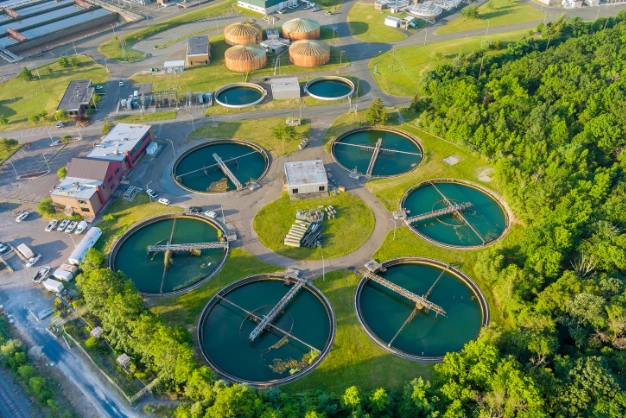TABLE OF CONTENTS
TABLE OF CONTENTS
What Are Corrosion Inhibitors?
Corrosion inhibitors are chemical compounds that, when added to a corrosive environment in small concentrations, significantly decrease the rate of corrosion of metals and alloys. Corrosion is a natural, electrochemical process that leads to the deterioration of metals when they react with the environment. This reaction often results in the formation of rust, pitting, and other types of metal degradation. Corrosion inhibitors are crucial in various industries to protect metal structures, machinery, and equipment, extending their service life and reducing maintenance costs.
Corrosion Inhibitors Types
Corrosion inhibitors are classified into several types based on their mechanism of action and the specific environments they are used in. The main types include:
Anodic Inhibitors
Anodic inhibitors, also known as passivators, form a protective oxide film on the anodic sites of the metal surface. This film reduces the metal’s tendency to oxidize and corrode. Common examples of anodic inhibitors are chromates, nitrites, and phosphates. These inhibitors are effective in neutral to slightly alkaline environments and are widely used in cooling systems, boilers, and other industrial applications.
Cathodic Inhibitors
Cathodic inhibitors reduce the corrosion rate by decreasing the rate of the cathodic reaction. They achieve this by precipitating on the cathodic areas of the metal surface, blocking the access of corrosive agents to these sites. Examples include zinc salts and polyphosphates. Cathodic inhibitors are often used in conjunction with anodic inhibitors to provide comprehensive protection.
Mixed Inhibitors
Mixed inhibitors affect both anodic and cathodic reactions, providing a balanced protective effect. These inhibitors are versatile and can be used in a wide range of environments. Silicates and certain organic compounds are examples of mixed inhibitors.
Volatile Corrosion Inhibitors (VCIs)
VCIs are used in enclosed environments, such as packaging and pipelines. These inhibitors release vapors that condense on the metal surface, forming a protective layer. VCIs are particularly useful for protecting metal parts during storage and transportation.
Organic Corrosion Inhibitors
Organic inhibitors are compounds containing nitrogen, sulfur, or oxygen. They adsorb onto the metal surface, forming a protective barrier. Common organic inhibitors include amines, azoles, and thiols. These inhibitors are effective in both acidic and neutral environments.
Inorganic Corrosion Inhibitors
Inorganic inhibitors, such as nitrites, molybdates, and silicates, form passive films on the metal surface. These films prevent corrosive agents from reaching the metal. Inorganic inhibitors are often used in water treatment and cooling systems.
How Corrosion Inhibitors Work
Corrosion inhibitors work through several mechanisms, depending on their type and the environment they are used in. The primary mechanisms include:
Adsorption
Many corrosion inhibitors work by adsorbing onto the metal surface, forming a protective film that prevents corrosive agents from contacting the metal. This adsorption can be physical or chemical, depending on the nature of the inhibitor and the metal surface.
Formation of Protective Films
Some inhibitors induce the formation of passive films on the metal surface. These films, often composed of oxides or other compounds, create a barrier that prevents further corrosion. Anodic inhibitors, for example, promote the formation of oxide films on the metal surface.
Alteration of Electrochemical Reactions
Corrosion is an electrochemical process involving anodic and cathodic reactions. Inhibitors can alter these reactions, reducing the overall corrosion rate. Cathodic inhibitors, for example, reduce the rate of the cathodic reaction, while anodic inhibitors decrease the anodic reaction rate.
Precipitation of Insoluble Compounds
Some inhibitors work by precipitating insoluble compounds on the metal surface. These compounds form a protective layer that prevents corrosive agents from reaching the metal. This mechanism is common in cathodic inhibitors and mixed inhibitors.
Corrosion Inhibitors Suppliers
When looking for reliable corrosion inhibitors suppliers, it’s crucial to choose a provider that offers high-quality products and comprehensive support. RawSource stands out as a leading supplier of corrosion inhibitors and other chemical commodities.
RawSource: Your Trusted Corrosion Inhibitors Supplier
At RawSource, we specialize in supplying a wide range of corrosion inhibitors suitable for various industries, including oil and gas, water treatment, automotive, and construction. Our products are designed to meet the highest standards of quality and effectiveness, ensuring optimal protection for your metal assets.
Why Choose RawSource?
Quality Assurance: Our corrosion inhibitors undergo rigorous testing to ensure they meet industry standards and deliver reliable performance.
Expert Support: Our team of experts is available to provide guidance and support, helping you choose the right inhibitors for your specific needs.
Comprehensive Range: We offer a diverse selection of corrosion inhibitors, including anodic, cathodic, mixed, and organic inhibitors, to cater to various applications.
Sustainability: We are committed to providing environmentally friendly solutions, offering green inhibitors derived from natural sources.
For more information on our range of corrosion inhibitors and to discuss your requirements, visit RawSource.
Conclusion
Corrosion inhibitors are essential in protecting metal structures and equipment from the damaging effects of corrosion. By understanding the different types of inhibitors and how they work, industries can effectively prevent corrosion, extend the lifespan of their assets, and reduce maintenance costs. RawSource offers a comprehensive range of high-quality corrosion inhibitors tailored to meet the diverse needs of various industries. With our commitment to quality and customer support, RawSource is your trusted partner in corrosion prevention.
FAQs
What are corrosion inhibitors?
Corrosion inhibitors are chemicals that reduce the corrosion rate of metals by forming a protective barrier on the surface.
What are the main types of corrosion inhibitors?
The main types are anodic, cathodic, mixed, volatile corrosion inhibitors (VCIs), organic, and inorganic inhibitors.
How do corrosion inhibitors work?
They work by adsorbing onto the metal surface, forming protective films, altering electrochemical reactions, or precipitating insoluble compounds.
Where are corrosion inhibitors commonly used?
They are used in industries such as oil and gas, water treatment, automotive, and construction.
Are there environmentally friendly corrosion inhibitors?
Yes, green inhibitors from natural sources are increasingly used to reduce environmental impact.
Where can I purchase high-quality corrosion inhibitors?
RawSource offers a wide range of high-quality corrosion inhibitors. Visit RawSource for more details.
Contact Us
Questions or looking for a quote?



